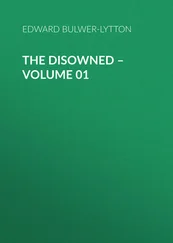Эдвард Бульвер-Литтон - The Disowned — Complete
Здесь есть возможность читать онлайн «Эдвард Бульвер-Литтон - The Disowned — Complete» — ознакомительный отрывок электронной книги совершенно бесплатно, а после прочтения отрывка купить полную версию. В некоторых случаях можно слушать аудио, скачать через торрент в формате fb2 и присутствует краткое содержание. Жанр: foreign_prose, literature_19, Европейская старинная литература, foreign_antique, на английском языке. Описание произведения, (предисловие) а так же отзывы посетителей доступны на портале библиотеки ЛибКат.
- Название:The Disowned — Complete
- Автор:
- Жанр:
- Год:неизвестен
- ISBN:нет данных
- Рейтинг книги:5 / 5. Голосов: 1
-
Избранное:Добавить в избранное
- Отзывы:
-
Ваша оценка:
- 100
- 1
- 2
- 3
- 4
- 5
The Disowned — Complete: краткое содержание, описание и аннотация
Предлагаем к чтению аннотацию, описание, краткое содержание или предисловие (зависит от того, что написал сам автор книги «The Disowned — Complete»). Если вы не нашли необходимую информацию о книге — напишите в комментариях, мы постараемся отыскать её.
The Disowned — Complete — читать онлайн ознакомительный отрывок
Ниже представлен текст книги, разбитый по страницам. Система сохранения места последней прочитанной страницы, позволяет с удобством читать онлайн бесплатно книгу «The Disowned — Complete», без необходимости каждый раз заново искать на чём Вы остановились. Поставьте закладку, и сможете в любой момент перейти на страницу, на которой закончили чтение.
Интервал:
Закладка:
While Warner was yet speaking, the person in question entered. His were, indeed, the form and face worthy to be seized by the painter. The peculiarity of his character made him affect a plainness of dress unusual to the day, and approaching to the simplicity, but not the neatness, of Quakerism. His hair—then, with all the better ranks, a principal object of cultivation—was wild, dishevelled, and, in wiry flakes of the sablest hue, rose abruptly from a forehead on which either thought or passion had written its annals with an iron pen; the lower part of the brow, which overhung the eye, was singularly sharp and prominent; while the lines, or rather furrows, traced under the eyes and nostrils, spoke somewhat of exhaustion and internal fatigue. But this expression was contrasted and contradicted by the firmly compressed lip; the lighted, steady, stern eye; the resolute and even stubborn front, joined to proportions strikingly athletic and a stature of uncommon height.
“Well, Wolfe,” said the young painter to the person we have described, “it is indeed a kindness to give me a second sitting.”
“Tusk, boy!” answered Wolfe, “all men have their vain points, and I own that I am not ill pleased that these rugged features should be assigned, even in fancy, to one of the noblest of those men who judged the mightiest cause in which a country was ever plaintiff, a tyrant criminal, and a world witness!” While Wolfe was yet speaking his countenance, so naturally harsh, took a yet sterner aspect, and the artist, by a happy touch, succeeded in transferring it to the canvas.
“But, after all,” continued Wolfe, “it shames me to lend aid to an art frivolous in itself, and almost culpable in times when Freedom wants the head to design, and perhaps the hand to execute, far other and nobler works than the blazoning of her past deeds upon perishable canvas.”
A momentary anger at the slight put upon his art crossed the pale brow of the artist; but he remembered the character of the man and continued his work in silence. “You consider then, sir, that these are times in which liberty is attacked?” said Clarence.
“Attacked!” repeated Wolfe,—“attacked!” and then suddenly sinking his voice into a sort of sneer, “why, since the event which this painting is designed to commemorate, I know not if we have ever had one solitary gleam of liberty break along the great chaos of jarring prejudice and barbarous law which we term forsooth a glorious constitution. Liberty attacked! no, boy; but it is a time when liberty may be gained.”
Perfectly unacquainted with the excited politics of the day, or the growing and mighty spirit which then stirred through the minds of men, Clarence remained silent; but his evident attention flattered the fierce republican, and he proceeded.
“Ay,” he said slowly, and as if drinking in a deep and stern joy from his conviction in the truth of the words he uttered,—“ay, I have wandered over the face of the earth, and I have warmed my soul at the fires which lay hidden under its quiet surface; I have been in the city and the desert,—the herded and banded crimes of the Old World, and the scattered but bold hearts which are found among the savannahs of the New; and in either I have beheld that seed sown which, from a mustard grain, too scanty for a bird’s beak, shall grow up to be a shelter and a home for the whole family of man. I have looked upon the thrones of kings, and lo, the anointed ones were in purple and festive pomp; and I looked beneath the thrones, and I saw Want and Hunger, and despairing Wrath gnawing the foundations away. I have stood in the streets of that great city where Mirth seems to hold an eternal jubilee, and beheld the noble riot while the peasant starved; and the priest built altars to Mammon, piled from the earnings of groaning Labour and cemented with blood and tears. But I looked farther, and saw, in the rear, chains sharpened into swords, misery ripening into justice, and famine darkening into revenge; and I laughed as I beheld, for I knew that the day of the oppressed was at hand.”
Somewhat awed by the prophetic tone, though revolted by what seemed to him the novelty and the fierceness of the sentiments of the republican, Clarence, after a brief pause, said,—
“And what of our own country?”
Wolfe’s brow darkened. “The oppression here,” said he, “has not been so weighty, therefore the reaction will be less strong; the parties are more blended, therefore their separation will be more arduous; the extortion is less strained, therefore the endurance will be more meek; but, soon or late, the struggle must come: bloody will it be, if the strife be even; gentle and lasting, if the people predominate.”
“And if the rulers be the strongest?” said Clarence.
“The struggle will be renewed,” replied Wolfe, doggedly.
“You still attend those oratorical meetings, cousin, I think?” said Warner.
“I do,” said Wolfe; “and if you are not so utterly absorbed in your vain and idle art as to be indifferent to all things nobler, you will learn yourself to take interest in what concerns—I will not say your country, but mankind. For you, young man” (and the republican turned to Clarence), “I would fain hope that life has not already been diverted from the greatest of human objects; if so, come to-morrow night to our assembly, and learn from worthier lips than mine the precepts and the hopes for which good men live or die.”
“I will come at all events to listen, if not to learn,” said Clarence, eagerly, for his curiosity was excited. And the republican, having now fulfilled the end of his visit, rose and departed.
CHAPTER XV
Bound to suffer persecution
And martyrdom with resolution,
T’oppose himself against the hate
And vengeance of the incensed state.
Born of respectable though not wealthy parents, John Wolfe was one of those fiery and daring spirits which, previous to some mighty revolution, Fate seems to scatter over various parts of the earth, even those removed from the predestined explosion,—heralds of the events in which they are fitted though not fated to be actors. The period at which he is presented to the reader was one considerably prior to that French Revolution so much debated and so little understood. But some such event, though not foreseen by the common, had been already foreboded by the more enlightened, eye; and Wolfe, from a protracted residence in France among the most discontented of its freer spirits, had brought hope to that burning enthusiasm which had long made the pervading passion of his existence.
Bold to ferocity, generous in devotion to folly in self-sacrifice, unflinching in his tenets to a degree which rendered their ardour ineffectual to all times, because utterly inapplicable to the present, Wolfe was one of those zealots whose very virtues have the semblance of vice, and whose very capacities for danger become harmless from the rashness of their excess.
It was not among the philosophers and reasoners of France that Wolfe had drawn strength to his opinions: whatever such companions might have done to his tenets, they would at least have moderated his actions. The philosopher may aid or expedite a change; but never does the philosopher in any age or of any sect countenance a crime. But of philosophers Wolfe knew little, and probably despised them for their temperance: it was among fanatics—ignorant, but imaginative—that he had strengthened the love without comprehending the nature of republicanism. Like Lucian’s painter, whose flattery portrayed the one-eyed prince in profile, he viewed only that side of the question in which there was no defect, and gave beauty to the whole by concealing the half. Thus, though on his return to England herding with the common class of his reforming brethren, Wolfe possessed many peculiarities and distinctions of character which, in rendering him strikingly adapted to the purpose of the novelist, must serve as a caution to the reader not to judge of the class by the individual.
Читать дальшеИнтервал:
Закладка:
Похожие книги на «The Disowned — Complete»
Представляем Вашему вниманию похожие книги на «The Disowned — Complete» списком для выбора. Мы отобрали схожую по названию и смыслу литературу в надежде предоставить читателям больше вариантов отыскать новые, интересные, ещё непрочитанные произведения.
Обсуждение, отзывы о книге «The Disowned — Complete» и просто собственные мнения читателей. Оставьте ваши комментарии, напишите, что Вы думаете о произведении, его смысле или главных героях. Укажите что конкретно понравилось, а что нет, и почему Вы так считаете.












